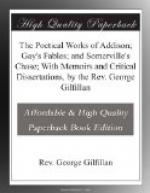The swarms, who, with industrious skill,
His hives with wax and honey fill,
In vain whole summer days employed,
Their stores are sold, their race destroyed.
What tribute from the goose is paid!
Does not her wing all science aid!
Does it not lovers’ hearts explain,
And drudge to raise the merchant’s gain?
40
What now rewards this general use?
He takes the quills, and eats the goose.
Man then avoid, detest his ways;
So safety shall prolong your days.
When services are thus acquitted,
Be sure we pheasants must be spitted.’
* * * * *
FABLE XVI.
THE PIN AND THE NEEDLE.
A pin, who long had served a beauty,
Proficient in the toilet’s duty,
Had formed her sleeve, confined her hair,
Or given her knot a smarter air,
Now nearest to her heart was placed,
Now in her mantua’s tail disgraced:
But could she partial fortune blame,
Who saw her lovers served the same?
At length from all her
honours cast;
Through various turns of life she pass’d;
10
Now glittered on a tailor’s arm;
Now kept a beggar’s infant warm;
Now, ranged within a miser’s coat,
Contributes to his yearly groat;
Now, raised again from low approach,
She visits in the doctor’s coach;
Here, there, by various fortune toss’d,
At last in Gresham Hall[3] was lost.
Charmed with the wonders of the show,
On every side, above, below,
20
She now of this or that enquires,
What least was understood admires.
’Tis plain, each thing so struck
her mind.
Her head’s of virtuoso kind.
‘And pray what’s
this, and this, dear sir?’
‘A needle,’ says the interpreter.
She knew the name. And thus the fool
Addressed her as a tailor’s tool:
’A needle with
that filthy stone,
Quite idle, all with rust o’ergrown!
30
You better might employ your parts,
And aid the sempstress in her arts.
But tell me how the friendship grew
Between that paltry flint and you?’
‘Friend,’
says the needle, ’cease to blame;
I follow real worth and fame.
Know’st thou the loadstone’s
power and art,
That virtue virtues can impart?
Of all his talents I partake,
Who then can such a friend forsake?
40
’Tis I directs the pilot’s
hand
To shun the rocks and treacherous sand:
By me the distant world is known,
And either India is our own.
Had I with milliners been bred,
What had I been? the guide of thread,
And drudged as vulgar needles do,
Of no more consequence than you.’
* * * * *




